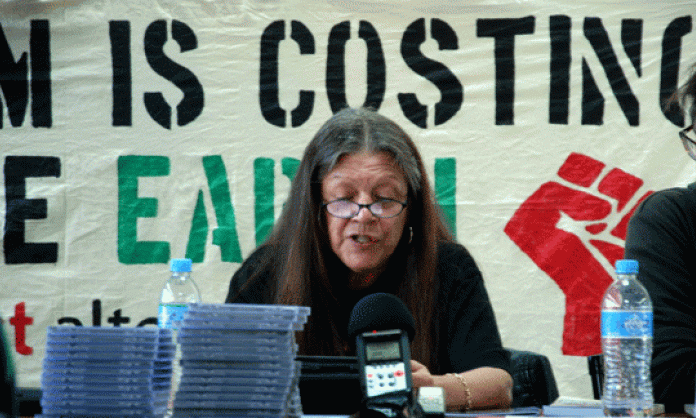Vickie Roach is an Indigenous writer, a poet and activist for women in the criminal injustice system.
She gained a masters degree while in prison and took the Howard government to court over its attempts to ban prisoners from voting – she won. She spoke at this year’s Marxism conference, Red Flag’s Kim Doyle was at the session.
“I’d like to tell you something of a story, and it starts with my mum, so you might want to get comfy.
“My mother spent pretty much her entire life in a home of one description or another. Her own mother had abandoned her at birth when she discovered that my grandfather, and by extension, her own new born daughter, were Aboriginal.”
The child welfare department decided her mother was the perfect candidate for assimilation. “She was never allowed the opportunity of being part of a loving family. My great-grandmother’s pleas to take my mother and rear her in a loving home with extended family fell repeatedly on deaf ears.”
Her mother became a ward of the state. In the system, she was often physically and sexually abused or simply used as a domestic servant. “When she wasn’t believed by the authorities about her mistreatment and was callously left in these placements, naturally, Mum would run away – probably where I get it from.” Her punishment was to spend the rest of her youth in the infamous Parramatta Girls’ Home.
Vickie’s mother is preparing to tell her story in a private submission to the royal commission into institutional responses to child sexual abuse, as is Vickie.
Vickie was born in 1958, only nine months after her mother’s release from Parramatta Girls’ Home. “They just opened the gate and let her out with a tram ticket and an address to go to with a boarding house.” She and her half-brother were taken into care when her mother, pregnant with her third child, presented at the local office for child welfare simply asking for assistance.
Vickie was put in a foster home and separated from her little brother.
“Mum told me she just gave up when she lost me; she said that something just went out inside her.”
Vickie was a very bright kid. She regularly came top of her class at school, but she also got into trouble a lot.
She wasn’t feeling love at home. “So I went looking for it elsewhere, as the song goes, in all the wrong places. The poor boy I fell in love with ended up getting five years in jail for carnal knowledge because I was only 12, and I got sent to a kids home for over a year. The charges for me were neglect, uncontrollable and EMD – or ‘exposed to moral danger’.”
She was sent to Glebe Metropolitan Girls’ Shelter, apparently for her own good, but also for running away from home all the time. “There I was sexually abused repeatedly by the doctor and then again by the superintendent of the girls’ training school where I was also sent for my own good.”
It was in these homes, as well as her foster home, that she was threatened with Parramatta Girls’ Home and another institution called Hay. “So in the face of all these dire threats, I did what any normal, defiant 13-year-old would do: I ran away to Nimbin.”
After a time, she wound up back in Sydney, under-age, with no money and no access to social security. “So I became a teenage hooker and acquired a heroin habit, not necessarily in that order, which led to my imprisonment in an adult maximum security prison at the age of 17.”
“I wasn’t even doing anything wrong when they grabbed me, except waiting for my dealer – but they didn’t know that. They saw what they believed to be needle marks on my arms. They promised to get me help, if I’d just admit that I used heroin. Now to me, I thought help sounded like a pretty good idea at the time. So I nodded to it – never trust a copper, word of warning. I wound up in a cell spewing my ring out from withdrawal and with a six month jail sentence.”
Unlike Vickie, her mother never went to prison. “She worked her guts out all her life, paid her taxes, paid her fines, did the right things struggling to make a better life for herself, and now she lives on a pension in a caravan park out in the bush on an oxygen machine.”
Vickie’s troubles didn’t start with jail; they began when her mother was stolen from the Aboriginal community and institutionalised.
“When I was taken from Mum, it put me straight into the juvenile justice system … it actually gave me a criminal record at the age of two … I was charged with those same three things: neglect, uncontrollable and exposed to moral danger. It was a device to be able to take children away from their parents.”
According to the Australian Bureau of Statistics, between 1995 and 2002, there was a 58 percent increase in the imprisonment rate for women in Australia, in contrast to a 15 percent increase for men. It’s much worse if you’re an Indigenous woman. A 2011 review by the Australian parliament found that, while Indigenous men are 17.5 times more likely than their non-Indigenous counterparts to go to jail, Indigenous women are 21.5 times more likely to be locked up than non-Indigenous women.
How do you account for this increase? “Have you noticed how many things have been criminalised these days? Protesting here in Victoria, for a start; freedom of association in Queensland … Watch this space; there’s more to come – get ready for it”, she warns.
“The entire system is rotten to the core, from the top down, and it all needs to come down. I’m not just talking about the prison system; the entire rotten capitalist system needs to come down.”








